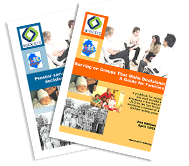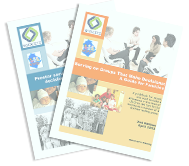Grade Level Parent Nights
Teaching for Change. Grade Level Parent Nights are structured conversations between parents and teachers regarding students’ academic success. In this format, teachers across a grade level host a communal meeting to exchange information with parents and find ways to support each other. Teachers share what the children are learning, how they are learning the content, and what strategies parents can use at home to encourage their child’s academic success.
http://www.teachingforchange.org/how-to-build-a-better-parent-teacher-night
Academic Parent-Teacher Teams (APTT)
nt-teacher conferences, Academic Parent–Teacher Teams involve two main components:
1. Three 75-minute classroom team meetings each year. These team meetings are initiated by a personal invitation to the parent by the teacher, and consist of the teacher, the entire class of parents, and a parent liaison. Each meeting includes a review of student academic performance data, parent–student academic goal setting, teacher demonstration of skills to practice at home, parent practice, and networking opportunities with other parents.
2. One 30-minute individual parent–teacher conference. In this yearly individual meeting parents and teachers review student performance data and create action plans to optimize learning.
https://globalfrp.org/Archive
WestEd: https://www.wested.org/wp-content/uploads/2017/03/services-appt-brochure.pdf
National PTA Parent Guides to Success
The Parents’ Guide to Student Success was developed in response to the Common Core State Standards in English language arts and mathematics that more than 45 states. Created by teachers, parents, education experts, and others from across the country, the standards provide clear, consistent expectations for what students should be learning at each grade in order to be prepared for college and career. There is an English/Language Arts and a Math Guide for Grades Kindergarten through Eighth Grade. There is also a guide for High School – one for English/Language Arts and the other for Math.
http://www.pta.org/parents/content.cfm?ItemNumber=2583
Common Core Works: Parent Roadmaps
The Council of the Great City Schools has developed content and grade-specific parent roadmaps that provide detailed information for parents about the expectations of the Common Core in English Language Arts and Literacy and Math. These roadmaps include examples of grade-level focus in the content area using parent-friendly language, sample progressions of learning across three grade levels in the Common Core, and tips to parents on communicating with teachers about their child’s work and how to support student learning at home. Grades K-8 and High school Parent Roadmaps for English Language Arts and Literacy have been posted and Spanish.
English Language Arts & Literacy: https://www.cgcs.org/domain/114
Mathematics: https://www.cgcs.org/Page/366
Shifts for Students & Families
A critical component of a student’s success in school is dependent on what and how they learn at home. This practical guide provides steps that parents can take to improve their child’s learning of the Common Core. This document has been translated to several languages.
http://www.engageny.org/resource/shifts-for-students-and-parents
Handout: http://www.engageny.org/sites/default/files/resource/attachments/parent_workshop_what_parents_can_do_handout.pdf
Reading Rockets
Families play an important role in how well students do in school. Find information about the importance of teachers and parents working together on behalf of kids, as well as examples of programs that specifically make the link between home and school. This website contains webcasts, articles, Parent Tip Sheets (in both English and Spanish), and research.
http://www.readingrockets.org/reading-topics/parent-engagement
Read On Wisconsin
Each month features one or more Read On Wisconsin titles for children and teens in five different age-level groups. We hope you’ll choose these books as read-alouds or book discussion selections, feature them in displays, or highlight them in other ways as you connect Wisconsin children and teens with books in your library or classroom.
On the ROW web site, you can find out about Read On Wisconsin titles and share information and ideas for ROW programming with other librarians and teachers in our FORUM.
Online literacy program:
http://readon.education.wisc.edu/
Strategies Packet for Parents and Students for Improving Reading, Writing, and Mathematics
The Northwest Evaluation Association created this checklist of strategies. The strategies in this checklist are suggestions that are intended to help increase a child’s understanding of reading, writing, and mathematics and develop his or her confidence in the learning process. Choosing two to three strategies and implementing them can help a child improve their academic achievement.
https://1.cdn.edl.io/QZEZShoiQwxs6CHJEaEIYbN68WYUvdc9zzv0CqTB7CoN3tgu.pdf
Building Capacity for Family, School, and Community Engagement Webinars
Effective family engagement is not a one-time program or the choice of a good school, but rather a set of day-to-day practices, attitudes, beliefs and interactions that support learning at home, at school, afterschool and during the summer. To ensure that the students of today are ready for the careers of tomorrow, families, schools, and community groups need to work together to promote engagement that is systemic, sustained, and integrated into school improvement efforts.
https://www.sedl.org/connections/engagement_webinars/about.html



